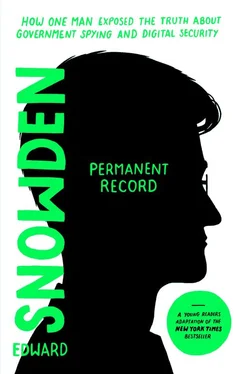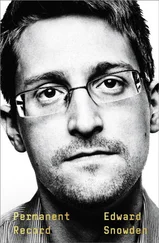During my Wi-Fi scavenger hunt drives I’d been researching various countries, trying to find a location for my meeting with the journalists. It felt like I was picking out my prison, or rather my grave. All of the Five Eyes countries were obviously off-limits. In fact, all of Europe was out, as were Africa and Latin America, because for various political reasons, I knew I wouldn’t be safe from the American government’s wrath if I got caught there. Russia was out because it was Russia, and China was China: Both were totally out of bounds. Due to the US government’s contentious relationship with both countries, I knew that I’d be painted as a traitor if I settled in either country.
The process of elimination left me with Hong Kong. In geopolitical terms, it was the closest I could get to no-man’s-land, but with a vibrant media and protest culture, not to mention largely unfiltered internet. In a situation with no promise of safety, it was enough to have the guarantee of time. Chances were that things weren’t going to end well for me, anyway: The best I could hope for was getting the disclosures out before I was caught.
The last morning I woke up with Lindsay—she was leaving on a camping trip to Kauai with friends—I told her how sorry I was for how busy I’d been and that I was going to miss her. And that she was the best person I’d ever met in my life. She smiled, pecked me on the cheek, and then got up to pack.
The moment she was out the door, I started crying, for the first time in years.
At least I had the benefit of knowing what was coming. Lindsay would return from her camping trip to find me gone, ostensibly on a work assignment, and my mother basically waiting on our doorstep. I’d invited my mother to visit, in a move so uncharacteristic that she must have expected another type of surprise—like an announcement that Lindsay and I were engaged. I felt horrible about the false pretenses, but I kept telling myself I was justified. My mother would take care of Lindsay, and Lindsay would take care of her. Each would need the other’s strength to weather the coming storm.
The day after Lindsay left, I took an emergency medical leave of absence from work, citing epilepsy, and packed scant luggage and four laptops: secure communications, normal communications, a decoy, and an “air gap” (a computer that had never gone and would never go online). I left my smartphone on the kitchen counter alongside a notepad on which I scribbled in pen Got called away for work. I love you. Then I went to the airport and bought a ticket in cash for the next flight to Tokyo. In Tokyo, I bought another ticket in cash, and on May 20 arrived in Hong Kong, the city where the world first met me.
The deep appeal of games, which are really just a series of increasingly difficult challenges, is the belief that they can be won. Nowhere is this more clear to me than in the case of the Rubik’s Cube. It satisfies a fantasy that if you just work hard enough and twist yourself through all of the possibilities, everything in the world that appears scrambled and incoherent will finally click into position and become perfectly aligned.
I’d had a plan—I’d had multiple plans—in which a single mistake would have meant getting caught, and yet I hadn’t been: I’d made it out of the NSA; I’d made it out of the country. I had beaten the game. By every standard I could imagine, the hard part was over.
But my imagination hadn’t been good enough, because the journalists I’d asked to come meet me weren’t showing up. They kept postponing, giving excuses, apologizing.
I knew that Laura Poitras—to whom I’d already sent a few documents and the promise of many more—was ready to fly anywhere from New York City at a moment’s notice, but she wasn’t going to come alone. She was busy trying to get Glenn Greenwald to commit, trying to get him to buy a new laptop that he wouldn’t put online. Trying to get him to install encryption programs so we could better communicate. And there I was, in Hong Kong, watching the clock tick away the hours, watching the calendar tick off the days. I was begging: Please come before the NSA realizes I’ve been gone from work too long . It was tough to face the prospect of being left in Hong Kong high and dry. I thought about my family and Lindsay and how foolish it was to have put my life in the hands of people who didn’t even know my name.
I barricaded myself in my room at the Mira Hotel, which I chose because of its central location in a crowded shopping and business district. I put the PRIVACY PLEASE—DO NOT DISTURB sign on the door handle to keep housekeeping out. For ten days, I didn’t leave the room for fear of giving a foreign spy the chance to sneak in and bug the place. With the stakes so high, the only move I had was to wait. I sent increasingly shrill pleas to my contacts. Then I’d stand at the window hoping for a reply, looking out onto the beautiful park I’d never visit. By the time Laura and Glenn finally arrived, I’d eaten every item on the room service menu.
That isn’t to say that I just sat around during that week and a half writing messages. I also tried to organize the last briefing I’d ever give—going through the archive, figuring out the most effective way to explain its contents to the journalists in the surely limited time we’d have together. It was an interesting problem: how best to express to nontechnical people who were inclined to be skeptical of me that the US government was surveilling the world and the methods by which it was doing so. I put together dictionaries of terms like metadata . I put together glossaries of acronyms and abbreviations.
I had to find a way to help Laura and Glenn understand something in the span of a few days that it had taken me years to puzzle out. Then there was another thing: I had to help them understand who I was and why I’d decided to do this.
* * *
At long last, Glenn and Laura showed up in Hong Kong on June 2. When they came to meet me at the Mira, I think I disappointed them, at least initially. They even told me as much, or Glenn did: He didn’t understand how a person as young as I was—he kept asking me my age—not only had access to such sensitive documents, but was also so willing to throw his life away. For my part, I didn’t know how they could have expected someone older, given my instructions about how to meet: Go to a certain quiet alcove by the hotel restaurant, furnished with a pleather couch, and wait around for a guy holding a Rubik’s Cube. The funny thing was that I’d originally been wary of using that bit of tradecraft, but the cube was the only thing I’d brought with me that was likely to be unique and identifiable from a distance. It also helped me hide the stress of waiting for what I feared might be the surprise of handcuffs.
That stress would reach its peak just ten or so minutes later, when I’d brought Laura and Glenn up to my room—#1014, on the tenth floor. Glenn had barely had the chance to stow his smartphone in my minibar fridge at my request when Laura started rearranging and adjusting the lights in the room. Then she unpacked her digital video camera. Though we’d agreed, over encrypted email, that she could film our encounter, I wasn’t ready for the reality.
Nothing could have prepared me for the moment when she pointed her camera at me, sprawled out on my unmade bed in a cramped, messy room that I hadn’t left for the past ten days. Though today nearly all of my interactions take place via camera, I’m still not sure which experience I find more uncomfortable: seeing myself on film or being filmed.
In a situation that was already high intensity, I stiffened. The red light of Laura’s camera, like a sniper’s sight, kept reminding me that at any moment the door might be smashed in and I’d be dragged off forever. And whenever I wasn’t having that thought, I kept thinking about how this footage was going to look when it was played back in court. I realized there were so many things I should have done, like putting on nicer clothes and shaving. Room service plates and trash had accumulated throughout the room. There were noodle containers and half-eaten burgers, piles of dirty laundry and damp towels on the floor.
Читать дальше












